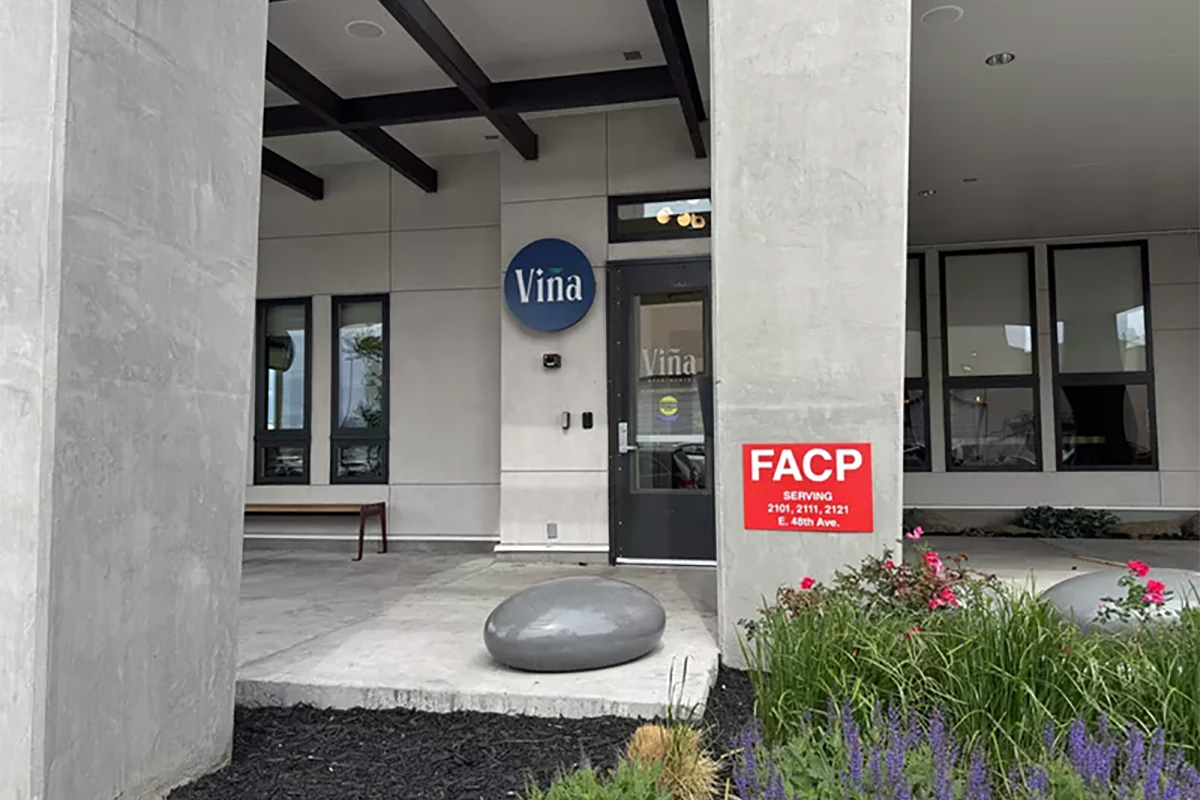At Viña Apartments in northeast Denver, doors don’t lock and trash chutes aren’t cleaned, according to tenants. After forming union, they were threatened with eviction.
Jessica Owens-Neckien has lived in the Viña Apartments in Denver’s Elyria Swansea neighborhood since 2022, when the 150-unit affordable housing building opened.
Almost immediately, she and other tenants noticed deficiencies in the building, including a lack of trash chute maintenance, insecure doors and broken intercoms and door systems that caused accessibility issues, according to Owens-Neckien. After those issues continued, residents formed the Viña Tenants’ Union in 2023 to help advocate for better maintenance at the 2121 East 48th Avenue property. Currently, the union has over forty members.
But after Owens-Neckien went door-to-door to see if more residents would be interested in joining the union last August, property management served her with a notice outlining her union-related activity as non-compliance with her lease. She would have to stop organizing or risk eviction.
Owens-Neckien is now serving as the class representative for a lawsuit filed in Denver District Court alleging the lease that Viña tenants were required to sign is illegal because it bans union organizing, a protected activity for tenants under Denver law.
The lawsuit seeks to prohibit property managers from issuing demand letters for union activity. Additionally, the lawsuit asks the court to prevent land lords and property managers from pursuing eviction for protected union activity and award damages to Owens-Neckien and others in her situation.
“This is a culmination of a lot of organizing efforts and a lot of management companies at Viña not listening to residents, not taking people seriously, and then, ultimately, retaliating against Jessica for raising those concerns,” says Cameron Netherland of the Justice for the People Legal Center, which represents Owens-Neckien.
In March, the Justice for People Legal Center won a historic judgment in favor of Denver tenants in a years-long case involving poor living conditions and unaddressed maintenance issues at Mint Urban Infinity apartments.
The Viña lawsuit names Syringa Property Management, Columbia Ventures and 48Race Residences as defendants. Syringa was the property manager at the time of Owens-Neckien’s demand letter, and Colombia and 48Race are listed as the developers of the property; 48Race is a legal entity formed as a partner to Colombia so the property could be financed using federal Low-Income Housing Tax Credits.
Viña’s units are all required to be listed at 80 percent Area-Median Income rates or lower, with half the units dedicated to those making 30 or 50 percent of the AMI. According to Alphonso Espino of the GES Coalition, a community group in the Globeville and Elyria Swansea neighborhoods, the building only became an affordable project because of requests from community organizers.
When the GES Coalition heard that developers were trying to build Viña, the group advocated for secured affordability provisions for people living in the historically disenfranchised neighborhoods.
“A lot of the work at the very beginning was about that, and then trying to find ways so that when they’re open, people from the neighborhood that were at risk of displacement, or that wanted a chance to come back to the neighborhood, would be able to,” Espino says.
Colombia agreed to meet GES Coalition on affordability terms, gaining community support in the process. But once the building opened, new problems arose.
Rent Increases and Maintenance Issues
Ever since moving to Viña in March 2022, shortly after the building opened, Owens-Neckien says she and her fellow residents rarely see maintenance requests completed in a timely manner. Even when property management says repairs have been completed, residents know they aren’t, she adds.
Because external doors haven’t been maintained, Owens-Neckien says non-residents and random people wander in regularly. Trash chutes are never cleaned, causing a rotting smell throughout the property, while the stairwells don’t have adequate lighting and the gate to the parking area has only worked for two weeks out of the three years of the building’s existence, she adds.
According to Espino, the complex’s automatic doors are regularly broken, creating accessibility obstacles to residents who use wheelchairs or other mobility devices. This is against Americans with Disabilities Act provisions, he says.
“It’s all these basic things that they should be keeping up with,” Espino says of the problems.
On top of maintenance problems, the GES Coalition has also often had to help people navigate “bogus charges” on their rent, according to Espino.
Owens-Neckien says she and her fellow tenants formed a union to protect themselves against these issues.
“There’s a lot of vulnerable people here, and they fear of losing their place to stay,” Owens-Neckien says. “These management companies, the owners, are not gods. People should be treated equally. We’re in low-income housing, but the property should be maintained as though we’re in market-rate housing.”
According to Dillon Baynes, managing partner with Colombia Ventures, the company strives to create a first-class facility that is clean and safe for all tenants. But tenants think Colombia’s efforts have fallen far short since the Viña opened, which is why they were especially upset when monthly rent increased by 12 percent in 2023.
The rent hike spurred residents to take action, says Owens-Neckien, who also felt Colombia’s communication in 2023 was poor.
“I was told it would be $50, and I had a notice on my door and I signed for an agreement for $50.02,” she says. “A week later, they came back and said, ‘We made a mistake. You’ll be receiving a $138 rent increase,’ so it was sort of like my signature meant nothing.”
Because the building is a Low-Income Housing Tax Credit property, the United States Department of Housing and Urban Development sets a range of allowable rent increases each year. The 12 percent rent increase in 2023 was within the HUD’s limit, but Espino sees it as further reason to question all of Colombia’s previous commitments to affordability.
“How long is this even going to be affordable for?” Espino asks.
Threatened With Eviction for Unionizing
Management met with tenants in the months following the union’s formation, but Owens-Neckien says talks ended around the spring of 2024.
“We were going over the same things, and they weren’t being transparent,” she says. “They decided that they no longer wanted to meet, because, I guess, if things aren’t mentioned, they don’t have to know about them.”
In August 2024 Owens-Neckien canvassed the property to see if neighbors shared her concerns, needed support or wanted to join the union. A property manager monitored Owens-Neckien’s activity and reprimanded her for soliciting, but she was not selling anything and disengaged immediately if people expressed disinterest, the lawsuit says.
Then, on September 16, Owens-Neckien and fellow union members delivered an official letter to management listing their raised concerns. Two days later, a Viña maintenance worker gave Owens-Neckien the demand for compliance, which said she had violated the lease in two ways: smoking on the property and disorderly conduct.
The demand letter accused Owens-Neckien of smoking on the property on September 12. That day, she says she smoked on a designated smoking bench outside the building where there is a cigarette disposal unit. Employees regularly smoke there, too, the lawsuit documents. Her attorney says the smoking allegation is bogus.
“In reality, the Demand for Compliance was issued for the sole purpose of retaliating against Owens-Neckien for her organizing efforts at the community,” the lawsuit says.
That purpose is made clearer by the disorderly conduct portion, the lawsuit argues, as the demand letter said, “On 9/16 and 9/17 we received multiple complaints of tenants being harrassed [sic] by knocking on each resident door as well as approaching in common areas for surveys and statements.”
But Owens-Neckien did not approach anyone in common areas, knock on any doors, or harass residents on either of those days, she argues. Additionally, the lawsuit says there is no evidence of any resident submitting a complaint that they felt harassed or had any issue with Owens-Neckien’s actions.
Rather, the demand letter seemed to threaten Owens-Neckien with eviction for her canvassing efforts on August 9 and for delivering the union letter on September 16.
“That’s organizing activity for which landlords cannot retaliate against a tenant,” Netherland adds.
Baynes says people can form clubs or groups if they’d like, but those groups need to “respect the rights of everybody.”
“If the garden club wants to meet up Wednesdays at 2 p.m. they need to talk with the property management office and set it up, and they need to have a quiet, orderly, respectful meeting,” he says. “If the garden club goes beyond that, there could be an issue. We’re trying to make sure that everyone’s quiet enjoyment is respected.”
Owens-Neckien says she called Netherland right away when she received the demand. The Justice for the People Legal Center aims to unite community organizing and legal action, so tenants had already met legal center members when they needed help organizing the union.
“All of the organizing work has been about accountability,” Netherland says. “They’re not only not responding to residents, not only not listening, not having those meetings, not making changes where changes are needed, but then also to come after the people who are trying to have a good-faith dialogue is despicable. Landlords need to understand that you can’t just ignore your responsibilities and then try and weed out the people that bring those concerns to your table.”
The lawsuit aims for class certification because the lease provision Owens-Neckien allegedly violated concerning disorderly conduct is included in every lease issued by Colombia and Syringa in Colorado. According to the lawsuit, Colombia has two additional properties in the works in Colorado while Syringa managed over 230 units at the time of Owens-Neckien’s situation. Additionally, the lawsuit adds that others have experienced efforts to “terminate or attempt to terminate the leases of tenants engaged in organizing activities in retaliation for those organizing activities.”
If the lease provision, or its use to quell union activity, is determined to be illegal under Colorado law, then everyone who signed a lease could be eligible for redress, Netherlands explains.
Owens-Neckien hopes the suit can prevent what happened to her from happening to anyone else.
“It shows management companies they can’t use a demand to threaten someone,” she says. “It’s intimidation. It stops people from speaking up. …I want to show other people that fear speaking up because of this that there’s nothing to fear and the only way changes are going to be made is if they speak up.”
Columbia and 48Race have secured counsel and are preparing a legal response; Syringa has yet to reply to the lawsuit or retain counsel, but declined to comment when contacted by Westword.
Read the full article: Westword | Written by: Catie Cheshire | Image by: Catie Cheshire/Westword






Leave A Comment